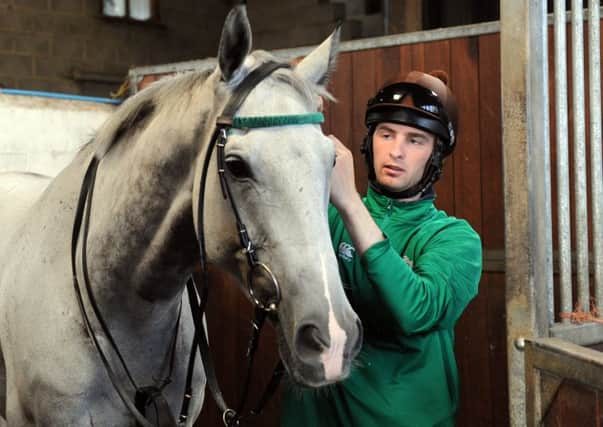Toomey is forever indebted to unsung heroes


To the rider, he was not the hero of the hour – the real heroes, he says, were the occupational therapists who helped him to rebuild his shattered life.
Three years ago this Monday, the North Yorkshire-based jockey was riding the favourite in a hurdle race when pitched head first into the turf at Perth and stopped breathing for six seconds before he was resuscitated. His chances of living, never mind riding again, were bleak – he spent 157 days in hospital.
Advertisement
Hide AdAdvertisement
Hide AdTwo years ago on this weekend, Toomey announced tentative plans for the unlikeliest sporting comeback of all.
And on this weekend 12 months ago, the Irish-born rider was preparing for a comeback ride at Southwell on the Phil Kirby-trained Kings Grey after regaining his licence despite part of his skull being cut away, due to pressure on his brain, and replaced with a steel plate.
That was the easy bit. There was no fairytale ending and the 27-year-old hung up his riding boots last month after 23 competitive rides yielded just two third-place finishes.
Yet there are no regrets. Toomey is now working in his native Ireland where he rides out for Flat trainer Tommy Stack, the jockey who rode Red Rum to an incomparable third Grand National win in 1977 before winning his own fight for life after being struck down with a virulent strain of meningitis.
Advertisement
Hide AdAdvertisement
Hide AdTogether with Stack’s son Fozzy, who lost his wife at a tragically young age, they are kindred spirits who just take each day in their stride.
Toomey returned to Yorkshire this week to address the College of Occupational Therapists’ annual conference in Harrogate.
It was the least he could do, he said. After all, these are the unsung heroes who taught him to do things that most people take for granted – like regaining balance and strength.
“Until my fall, I didn’t realise what they did – and how important their work is,” Toomey told The Yorkshire Post.
Advertisement
Hide AdAdvertisement
Hide Ad“The surgeons, doctors and nurses were brilliant, but it’s also a whole new world when you leave hospital and start again.
“The recovery is just as important as getting out of hospital. Jockeys are lucky. We have insurance cover and the like. Others are not.
“It’s why I wanted to support the OT staff. The NHS needs them. Without them, I would not have made it back riding.
“They give you little goals, so you could make steady progress, rather than one big goal which can do more harm than good if it doesn’t come off. It’s not just the physical side of things – much of it is mental.”
Advertisement
Hide AdAdvertisement
Hide AdToomey worked closely with both Rachel Charles and Susannah Giles, from Neural Pathways, with the latter saying: “Our main aim with Brian was to prevent him from losing his motivation to achieve his goals. And he didn’t. We wanted to engage him in activities that prevented him from losing that drive to get back into work.
“Occupational therapy focuses on the activities or occupations that matter most to people.”
However, Toomey, who now views his life as a “daily learning curve”, is content with his fate. With just 49 career winners to his name before his fall, winning the confidence of trainers and owners, after such a brush with death, was always going to be an uphill struggle.
In hindsight, it was probably misguided, he conceded, to put friends and family through the heartache of the comeback when he had already won the most important race of all – the race for life.
Advertisement
Hide AdAdvertisement
Hide Ad“Looking back, I wasn’t ready for it. I was nervous going to the very first obstacle at Southwell,” he says.
However the deep desire to ride again gave him the motivation to go through with his rehabilitation.
In this regard, Toomey views his comeback as a success – but he concedes he is now far happier riding out for the Stack family without the pressure of race riding. “I needed to get the riding out of me. If not, I would have spent the rest of my life wondering ‘what if?’
“I’m a stubborn so and so, but I accept I’m not going to be a jockey. Now I can look forward to the rest of my life.”
As such, Brian Toomey will be eternally grateful to every doctor, nurse and therapist who not only saved his life, but then rebuilt it.
They will always be his heroes.